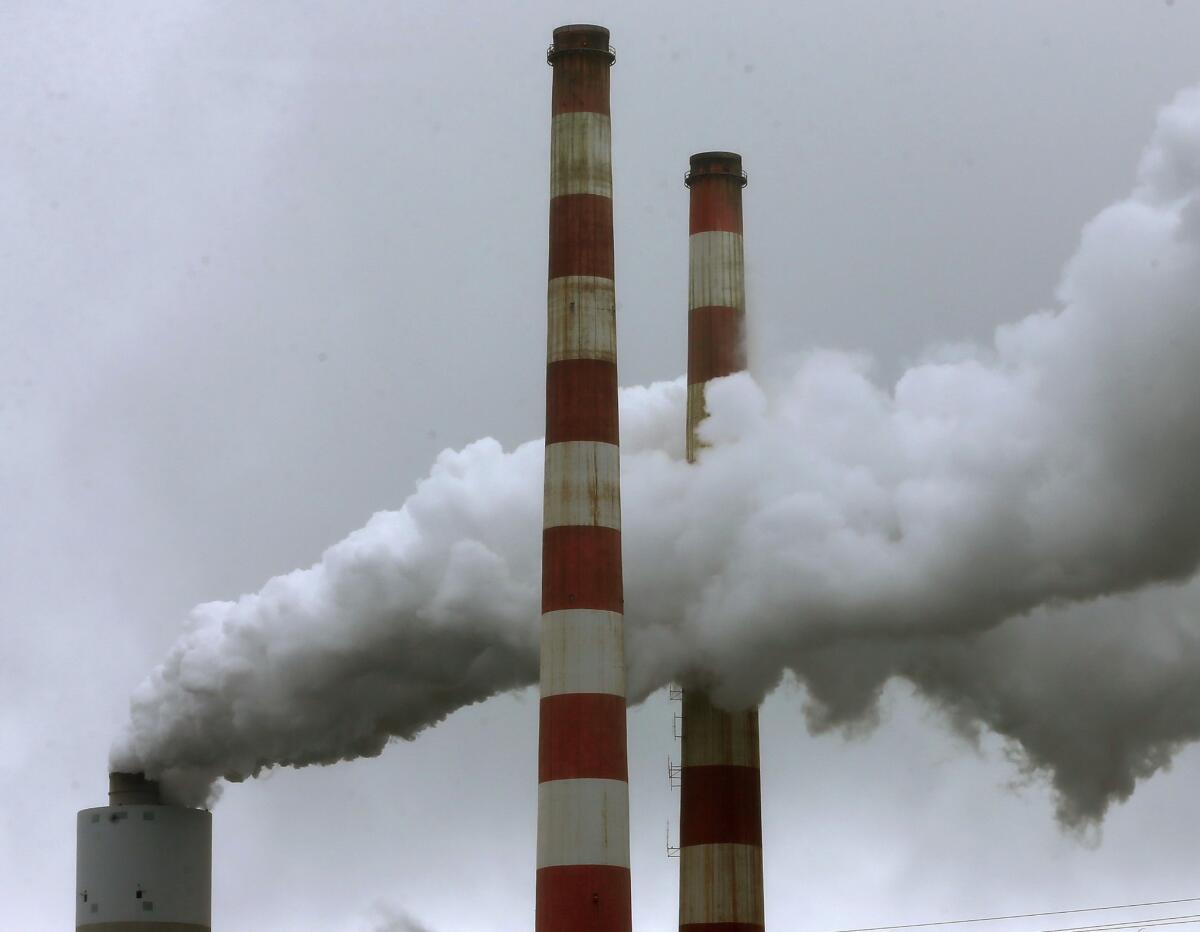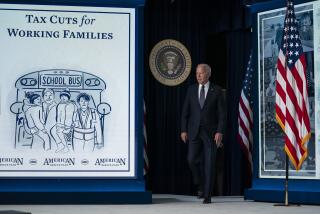Opinion: New survey: Public likes carbon taxes, with caveats

- Share via
Despite their hostility to new taxes that they might have to pay themselves, a sizable majority of Americans can support a tax on carbon if it’s structured the right way, according to a survey released Monday by the University of Michigan’s Center for Local, State, and Urban Policy.
The survey, done in conjunction with Muhlenberg College’s Institute of Public Opinion in Pennsylvania, found that the enthusiasm for carbon taxes depends on what the government does with the revenue and, potentially, the size of the tax. Surprisingly, it showed the strongest support not for returning all the revenue collected to the public via rebates, but for using it to promote renewable energy.
“Conventional wisdom holds that a carbon tax, while attractive on economic grounds, is a political non-starter,” the report’s authors state. “The survey results reported here suggest that this conclusion may be premature.”
Yet policymakers shouldn’t leap to the conclusion that the skids have been greased for a tax on the carbon emissions from fossil fuels. The survey results hint that the public may not accept a tax large enough to put much of a dent in emissions. And the majority it found in favor of certain types of carbon taxes included both those who said they “strongly” supported the idea those who said they “somewhat” supported it, which may overstate the real level of approval.
Beyond that, it’s worth taking with a grain of salt any attempt to divine the views of 318 million people from a tiny sampling. Nevertheless, the survey was designed to reflect as accurately as possible the opinions of the broader population. It gathered responses from about 800 randomly selected people across the country in March and April, with a margin of sampling error of plus or minus 3.5%. According to co-author Barry G. Rabe of the University of Michigan, that’s a good result for a national poll. Rabe also said that the breakdown of Democrats, Republicans and Independents polled mirrors the national percentages.
Proponents of a tax on carbon emissions say it would encourage industries and consumers to curb their use of fossil fuels, which are one of the main contributors to climate change. The idea has drawn stiff opposition not just from those who question the existence of climate change or mankind’s role in it, but also from anti-tax conservatives who fear that liberals will use the revenue to finance a larger and more intrusive federal government.
The survey asked whether people supported or opposed various approaches to a federal tax on carbon-based fuels, such as coal, oil and natural gas. It started by asking about a tax to reduce greenhouse gases, without specifying how large it might be or how the revenue might be used. Only 34% were in favor overall, with support ranging from 15% among Republicans to 47% among Democrats. Opposition, meanwhile, ranged from 47% of the Democrats to 81% of the Republicans.
The ardor cooled even further when respondents were told that the tax would increase their monthly energy costs 10%. That reduced support to 29%, with 56% to 87% of the Democrats, Independents and Republicans opposing.
One might wonder what people were thinking when the first question was asked. Any tax on carbon is going to increase monthly fuel, gas and electricity bills. The only issues are how much bills will increase and whether any of the higher costs will be refunded by the feds.
Similarly, the survey found little interest in a carbon tax that helped lower the federal budget deficit. More than half of all respondents opposed such an idea, including 55% of Democrats, 60% of independents and 63% of Republicans, and only 38% supported it.
That sentiment turned on its head when respondents were asked about a carbon tax that raised no money for the government, but instead returned every dollar to the public in the form of rebates. Overall, 56% supported this idea, including 52% of independents and 65% of Democrats. Only among Republicans did opponents outnumber supporters, 53% to 43%. The total-rebate approach is favored by such advocacy groups as the Citizens Climate Lobby and some conservatives, who see it as a way to avoid the carbon tax becoming a piggy bank for federal programs.
According to the survey, the public’s interest in a carbon tax was even stronger when the revenue was dedicated to “research and development for renewable energy programs.” Overall support was 60%, including majorities in each political affiliation. Fully 70% of the Democrats liked the idea, along with 54% of the independents.
The margin among Republicans -- 51% in support, 47% in opposition -- was small enough to be within the survey’s margin of error. Still, when asked how the government should use the money if a carbon tax were adopted, Republicans favored spending on renewable energy over rebate checks and deficit reduction by a wide margin. So did independents and Democrats, by an even larger amount.
Again, this is just one survey, and the hostility expressed to a carbon tax that raised energy bills may be more telling than the thumbs up for one that supported renewable energy R&D. Yet the support for the latter should give Congress something to think about should lawmakers ever agree to take action on climate change. (Insert your joke about hell freezing over here.)
Follow Healey’s intermittent Twitter feed: @jcahealey
More to Read
A cure for the common opinion
Get thought-provoking perspectives with our weekly newsletter.
You may occasionally receive promotional content from the Los Angeles Times.










